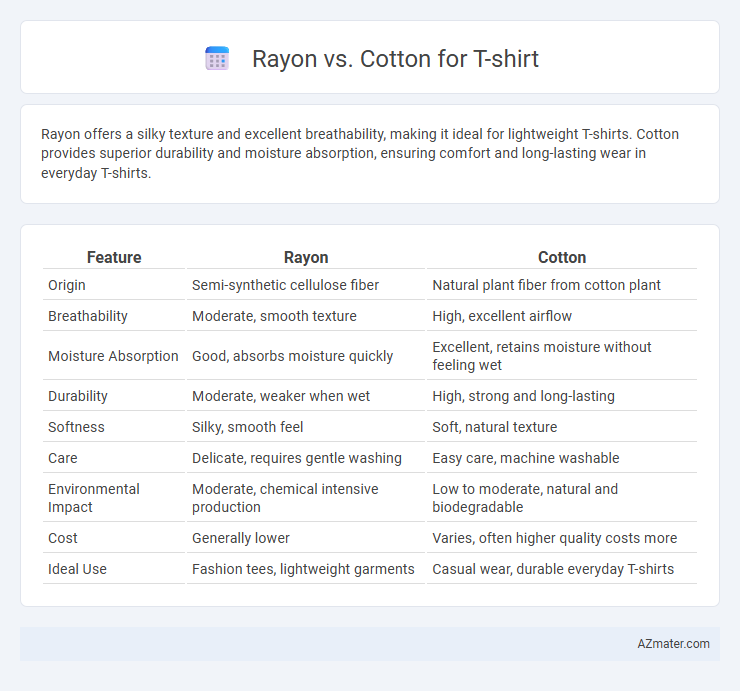Rayon offers a silky texture and excellent breathability, making it ideal for lightweight T-shirts. Cotton provides superior durability and moisture absorption, ensuring comfort and long-lasting wear in everyday T-shirts.
Table of Comparison
| Feature | Rayon | Cotton |
|---|---|---|
| Origin | Semi-synthetic cellulose fiber | Natural plant fiber from cotton plant |
| Breathability | Moderate, smooth texture | High, excellent airflow |
| Moisture Absorption | Good, absorbs moisture quickly | Excellent, retains moisture without feeling wet |
| Durability | Moderate, weaker when wet | High, strong and long-lasting |
| Softness | Silky, smooth feel | Soft, natural texture |
| Care | Delicate, requires gentle washing | Easy care, machine washable |
| Environmental Impact | Moderate, chemical intensive production | Low to moderate, natural and biodegradable |
| Cost | Generally lower | Varies, often higher quality costs more |
| Ideal Use | Fashion tees, lightweight garments | Casual wear, durable everyday T-shirts |
Introduction to Rayon and Cotton Fabrics
Rayon fabric, a semi-synthetic fiber made from cellulose, offers a silky texture and excellent moisture absorption, making it ideal for lightweight, breathable t-shirts. Cotton, a natural fiber harvested from cotton plants, is renowned for its softness, durability, and hypoallergenic properties, ensuring comfort and longevity in t-shirt wear. Both fabrics provide breathability and comfort, but their fiber compositions influence the t-shirt's feel, care requirements, and performance in different climates.
Key Differences Between Rayon and Cotton
Rayon, a semi-synthetic fiber made from cellulose, offers a silky texture and excellent drape, making it lightweight and breathable but prone to shrinking and wrinkling. Cotton, a natural fiber derived from cotton plants, is durable, absorbent, and soft, providing superior breathability and moisture absorption while maintaining shape and withstanding frequent washing. Key differences include rayon's smooth, fluid feel versus cotton's more textured surface, and cotton's higher durability and ease of care compared to rayon's delicate handling requirements.
Comfort and Softness Comparison
Rayon T-shirts offer superior softness and a silky feel compared to cotton, enhancing comfort in warm weather due to their excellent breathability and moisture-wicking properties. Cotton T-shirts provide natural softness with a slightly coarser texture but excel in durability and absorbency, making them comfortable for everyday wear. Consumers seeking lightweight, smooth fabric often prefer rayon, while those prioritizing natural fibers and long-lasting comfort typically choose cotton.
Breathability and Moisture-Wicking Properties
Rayon offers excellent breathability due to its semi-synthetic cellulose fibers, allowing air to flow freely and keeping the wearer cool. Cotton excels in moisture-wicking by absorbing sweat efficiently, though it may retain moisture longer, leading to a heavier feel. For activewear T-shirts, cotton provides better moisture absorption, while rayon enhances ventilation and dryness under moderate activity.
Durability and Longevity of Fabrics
Rayon and cotton differ significantly in durability and longevity, with cotton fibers being naturally stronger and more resistant to wear and tear, making cotton T-shirts typically last longer under regular use. Rayon, a semi-synthetic fabric made from cellulose fibers, tends to be less durable due to its weaker fiber structure and sensitivity to moisture, which can lead to fabric weakening and quicker degradation over time. For high-performance and long-lasting T-shirts, cotton remains the preferred choice due to its resilience and sustained quality despite frequent washing and everyday wear.
Ease of Care and Maintenance
Rayon T-shirts require gentle washing and air drying to maintain fabric integrity, as they are prone to shrinking and wrinkling. Cotton T-shirts offer greater ease of care, with high durability under machine washing and drying, making them more resistant to wear and tear over time. For low-maintenance wardrobe options, cotton is generally preferred while rayon needs more delicate handling to preserve its softness and shape.
Environmental Impact and Sustainability
Rayon production typically relies on chemically intensive processes and significant water usage, leading to higher environmental impact compared to cotton. Cotton cultivation demands extensive land, water, and pesticides, raising concerns about soil degradation and biodiversity loss. Sustainable alternatives like organic cotton and lyocell-based rayon minimize ecological footprints, promoting more eco-friendly T-shirt options.
Affordability and Price Factors
Rayon T-shirts generally offer a more affordable option due to lower material costs and streamlined production processes compared to cotton. Cotton tends to be pricier because of its natural cultivation requirements and durability, impacting overall garment cost. Price sensitivity among consumers often drives demand for rayon-based T-shirts in budget-conscious markets.
Ideal Uses: When to Choose Rayon or Cotton T-shirts
Rayon T-shirts are ideal for warm weather and active wear due to their lightweight, moisture-wicking properties, and smooth texture that drapes well on the body. Cotton T-shirts suit everyday casual wear and cooler climates because of their breathability, durability, and natural softness, providing comfort and long-lasting wear. Choose rayon for stylish, soft, and breathable options in humid conditions, while cotton works best for versatile, easy-care garments in various environments.
Conclusion: Which Fabric is Best for Your T-shirt?
Rayon offers a silky texture and excellent breathability, making it ideal for lightweight and drapey t-shirts, while cotton provides superior durability, moisture absorption, and ease of care, perfect for everyday casual wear. Choosing between rayon and cotton depends on your priorities: opt for rayon if you want a soft, luxurious feel with good airflow, or cotton for a more resilient and low-maintenance option. For sustainable and long-lasting t-shirts, cotton remains the preferred fabric, whereas rayon suits those seeking a stylish, comfortable garment with a smooth finish.

Infographic: Rayon vs Cotton for T-shirt
 azmater.com
azmater.com